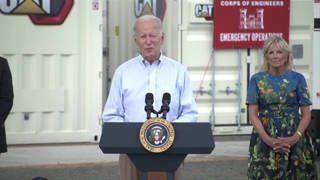
Guests
- Juan GonzálezDemocracy Now! co-host and award-winning reporter following Puerto Rico.
- Randi Weingartenpresident of the American Federation of Teachers.
Puerto Rico officially raised the death toll from Hurricane Maria last year from 64 to nearly 3,000 following the release of a study ordered by the governor of the island. This officially makes Maria one of the deadliest storms in U.S. history. We get response from Democracy Now! co-host Juan González and Randi Weingarten, president of the American Federation of Teachers.
Transcript
AMY GOODMAN: Before we go, with Juan and Randi Weingarten here, Randi, I think you’ve been in Puerto Rico like 11 times since Hurricane Maria, and, of course, Juan, you’re one of the leading thinkers and activists on the issue of Puerto Rico and journalists covering what has happened there, born there. Talk about this latest news, our top headline, that the government has finally acknowledged that more people died as a result of Hurricane Maria than they previously said. I think they said, what, 64? They came to that number. Now it’s 46 times that, nearly 3,000 people. Other studies put it past 5,000. What’s the significance of this?
JUAN GONZÁLEZ: Well, it seems to me, if people remember Hurricane Katrina, Hurricane Katrina was probably the low point of the Bush administration, in terms of its demonstrating—the George W. Bush administration—that it was incapable of handling a disaster of the type that Katrina represented. Yet somehow the crisis in Puerto Rico and this not only ability to handle the immediate crisis, but then even to properly account for and count the dead, to me, has to be, certainly for the government of Puerto Rico—the governor of Puerto Rico has not received, in my estimation, sufficient criticism for the failures of his government to properly address the crisis in the days after Hurricane Katrina, but also for the Trump administration. Somehow the Trump administration has managed to push the Maria crisis aside, and the failure of the federal response to [Maria], so that we now have an official recognition of nearly 3,000 dead, perhaps possibly more, because it could conceivably be more, but at least now close to 3,000 dead. It’s astonishing, a year later, as we’re entering the 1-year anniversary of Maria. But I know, Randi, you’ve been there multiple times—
RANDI WEINGARTEN: Right.
JUAN GONZÁLEZ: —to Puerto Rico, and you’ve especially dealt with how the local government and the federal government have used the crisis as a prime example of what Naomi Klein calls disaster capitalism—
RANDI WEINGARTEN: Exactly right.
JUAN GONZÁLEZ: —to reconfigure the education system of the island.
RANDI WEINGARTEN: It’s—you know, it is, in some ways, colonialism at its worst, 2018. The scene, three weeks—the first time I was there, three weeks after the hurricane, when we could finally get commercial flights in, you went outside of San Juan, and it looked like a war zone—kids drinking water from streams. This is 2017 and 2018. And so, you know, separate and apart from the fact that we actually got 100,000 water filters there, with Operation Blessing—so, picture the AFT and Operation Blessing, an evangelical Christian group, working together, with the mayor of San Juan and our affiliate there, to do this. But you knew that that number was false from the moment—any person who is alive and could actually feel knew that that number was wrong.
But the point that Juan is making, that—I don’t know if it was negligence, malevolence. Probably both. The utter failure to understand a hurricane on an island and prepare for that, particularly in light of what had happened in Katrina, that is a failure of the Trump administration. And you compare it to the preparation in Florida and in Houston right beforehand, and then the failure over the course of the next three months, as exemplified by Donald Trump just throwing paper towels. So, there is a sense—Puerto Ricans are American citizens, and they have not been treated that way.
And then, on top of it, the disaster being used to privatize and to close a huge number of schools, let me just say one thing about that. What I saw over the course of the next few weeks is that teachers and parents wanted their neighborhood schools, of which there are many—the same number, frankly, as in 1917. It’s not as if there were many more, but the same number of schools in 1917, 2017. They use those schools as key to keeping communities together, particularly when there was no lights and when there was no government facilities. And so, when you have those schools closed now and kids walking down streets that are still in bad shape, that is a second disaster that says to kids that your communities, which are the heart of what people believe in Puerto Rico, don’t count.
AMY GOODMAN: Well, we’re going to leave it there, and of course we’ll continue to cover Puerto Rico. Randi Weingarten, president of the American Federation of Teachers. Adam Skaggs, Giffords Law Center to Prevent Gun Violence, chief counsel there.
When we come back, we go to Texas to speak with a woman sentenced to five years in prison for casting a provisional ballot in the 2016 election, not understanding Texas law about what happens to people who have felony records. Stay with us.













Media Options